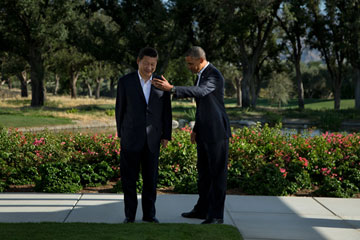
President Barack Obama, right, welcomes Chinese President Xi Jinping at the Annenberg Retreat at Sunnylands, Friday, June 7, 2013, in Rancho Mirage, Calif.
(2 of 5)
Treating China's rising power as an afterthought, Obama's advisers concluded, would be a dangerous mistake. As the world's fastest-growing region, Asia represents the future of much of the American economy. The Middle East still presents security threats, but the global order will be decided by the behavior of China and its neighbors, which include India and Russia. A peaceful and cooperative China could lead to a global boom in prosperity. An insular and hostile one could prompt a superpower competition with the U.S. not seen since the Cold War. "We came into office and tried to take a broad look at the world and ask where we were underinvested--and we were underinvested in Asia," says Tom Donilon, who stepped down as Obama's National Security Adviser in June. "The same time that the U.S. was overwhelmingly focused, and for good reason, on Iraq in the mid-2000s was the same time that Asia was experiencing one of the greatest economic expansions in history."
The result was a strategy first unveiled publicly in a 2011 Foreign Policy article by then Secretary of State Hillary Clinton. Titled "America's Pacific Century," the article declared that the U.S. stood "at a pivot point" as it wound down its post-9/11 conflicts, and it called for "substantially increased investment" in diplomacy, trade and military power in the region.
With the new vision came a flurry of diplomatic actions. Clinton attended every summit of the Association of Southeast Asian Nations (ASEAN) during her tenure, a first for a U.S. Secretary of State, and Obama has attended three of them; his canceled trip would have included his fourth. (George W. Bush, by contrast, never attended one.) At the same time, the U.S. reaffirmed ties with nations such as Japan and Singapore that had struggled to get a call returned from Bush officials fixated on al-Qaeda and Iraq. Obama and Clinton thawed relations with long-isolated Burma and struck a deal to assist Vietnam with a civilian nuclear program. Obama's team also cranked up its pursuit of a Trans-Pacific Partnership trade deal--a potentially massive pact involving 12 countries, including five Asian nations, that would create a new, NAFTA-like free-trade zone that the U.S. hopes can help draw China into a more Western-oriented trade system. Obama is so eager to pass it quickly that some business groups have warned against rushing an imperfect deal.
